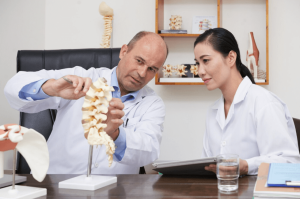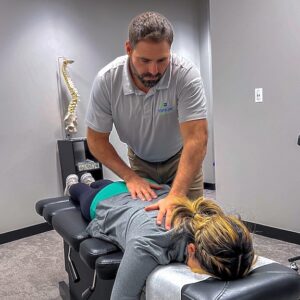Are you experiencing persistent back pain that radiates to your arms or legs? It could be a sign of a herniated disc, a common spinal issue that can significantly affect your daily life. While there are various treatment options available, chiropractic care stands out as a holistic and effective approach to alleviate discomfort caused by herniated discs.
Understanding Herniated Discs
Certainly, understanding the intricacies of a herniated disc is crucial in comprehending its impact and the necessity for appropriate treatment. The spine, a complex structure supporting the body, consists of intervertebral discs nestled between the vertebrae. These discs serve as cushions, facilitating spinal flexibility and absorbing shocks during movement. However, when the sturdy outer layer of a disc weakens or sustains a tear, the soft gel-like substance within can herniate or protrude, creating a herniated or slipped disc. This protrusion often exerts pressure on nearby nerves, leading to irritation and inflammation. Consequently, individuals may experience a range of symptoms such as localized or radiating pain, numbness, tingling sensations, and muscle weakness in the affected area. These symptoms can vary in intensity and location depending on the location and severity of the herniation along the spine.
The nerve irritation caused by a herniated disc is a key factor contributing to the discomfort and limitations individuals face. The compression of nerves due to the protruding disc material leads to the transmission of abnormal signals, resulting in sensations of pain, numbness, or tingling. Moreover, the compromised nerve function can lead to muscle weakness in specific areas connected to those affected nerves. This interference with nerve signaling not only causes physical discomfort but can also impact an individual’s mobility, potentially hindering their ability to perform routine tasks comfortably. Recognizing these mechanisms underlying a herniated disc is fundamental in seeking appropriate treatment, including chiropractic care, aimed at alleviating symptoms and restoring spinal health.
Signs You Might Have a Herniated Disc
Identifying the symptoms of a herniated disc is crucial for seeking timely treatment. Common signs include:
Persistent and Localized Pain: Herniated discs often manifest with persistent and localized pain, primarily centered in the affected area of the spine. This pain is frequently described as sharp, shooting, or even burning in nature. It tends to remain consistent and may intensify during specific movements like bending forward, lifting heavy objects, or twisting the torso. This discomfort can vary in intensity, sometimes being tolerable and at other times causing severe limitations in movement.
Numbness or Tingling Sensations: Nerve compression resulting from a herniated disc can cause sensations of numbness, tingling, or pins and needles in the areas connected to the affected nerves. For instance, if the herniation occurs in the lower back, these sensations can radiate down through the buttocks and into one or both legs, a condition commonly referred to as sciatica. This symptom might come and go or persist for extended periods.
Muscle Weakness: When a herniated disc affects nerves that control muscle function, it can lead to muscle weakness. This weakness might manifest as difficulty in lifting objects, decreased grip strength, or challenges in performing regular activities like walking or climbing stairs. Muscle weakness can impact daily life and significantly limit one’s physical capabilities.
Changes in Reflexes: A herniated disc may influence reflexes, causing changes that can be detected during a physical examination. Diminished or exaggerated reflexes in the affected area might indicate nerve involvement due to disc herniation. This alteration in reflex responses can be an important clinical sign for healthcare professionals assessing a potential disc issue.
Pain Aggravated by Certain Positions or Movements: Individuals with a herniated disc may experience pain exacerbation triggered by specific movements or positions. Activities like coughing, sneezing, sitting for prolonged periods, or engaging in sudden movements might worsen the discomfort associated with the condition. This increased pain during certain actions can be a key indicator of a disc-related problem.
Difficulty Walking or Standing: In severe cases of disc herniation, the pain and discomfort can significantly impact mobility, making walking or standing challenging. This difficulty often stems from nerve compression and can lead to alterations in gait, making it uncomfortable to walk or maintain an upright position for extended periods.
Bowel or Bladder Dysfunction (Rare Cases): In extremely rare instances where the herniated disc significantly impacts nerves responsible for bowel or bladder function, individuals might experience changes in their ability to control urination or bowel movements. This symptom, known as cauda equina syndrome, is a medical emergency requiring immediate attention and intervention.
When to Consider Chiropractic Treatment
Persistent Pain Despite Conventional Treatments:
If you’ve tried traditional treatments such as pain medications, muscle relaxants, or physical therapy without experiencing significant relief, chiropractic care might offer a different approach. Chiropractors focus on identifying and addressing the root cause of the pain, aiming to alleviate discomfort by realigning the spine and reducing nerve pressure.
Functional Limitations and Reduced Mobility:
Herniated discs can severely impact daily activities, leading to limitations in movement and functionality. Chiropractic adjustments aim to restore spinal alignment, potentially improving mobility and easing the challenges associated with performing routine tasks.
Avoiding Surgical Intervention:
Many individuals prefer exploring non-surgical options before considering invasive procedures. Chiropractic care presents a non-invasive alternative that may help manage herniated discs without the need for surgery. By addressing misalignments and promoting natural healing, chiropractors offer a conservative approach to alleviate symptoms.
Prefer Holistic and Drug-Free Solutions:
For those who seek drug-free and holistic treatment options, chiropractic care aligns with these preferences. Chiropractors emphasize natural healing, focusing on spinal adjustments, lifestyle modifications, and rehabilitative exercises to encourage the body’s innate ability to heal itself.
Recurrent or Chronic Symptoms:
If you experience recurring episodes of back pain, numbness, tingling sensations, or muscle weakness due to a herniated disc, chiropractic treatment can offer ongoing management and preventive strategies. Regular chiropractic sessions may help manage chronic symptoms and prevent future flare-ups.
Desire for Personalized Care:
Chiropractors provide personalized treatment plans tailored to individual needs. They conduct thorough assessments to understand the specific concerns and develop customized approaches that address the unique conditions and preferences of each patient.
The Role of a Chiropractor
Chiropractors specialize in spinal health and offer personalized treatment plans tailored to individual needs. Through spinal adjustments and manipulations, chiropractic care focuses on realigning the spine, reducing inflammation, and restoring proper function to the affected area. Additionally, chiropractors may incorporate complementary therapies like massage, exercises, and lifestyle recommendations to enhance recovery and prevent future issues.
Diagnostic Expertise:
Chiropractors possess a deep understanding of spinal health and neuro-musculoskeletal disorders. They conduct comprehensive assessments to pinpoint the exact cause and extent of a patient’s herniated disc, using various diagnostic techniques, including physical examinations and sometimes imaging studies like X-rays or MRI scans. This enables them to create tailored treatment plans.
Personalized Treatment Plans:
Each patient’s condition is unique, and chiropractors emphasize personalized care. They develop treatment strategies tailored to individual needs, considering factors such as the severity of the herniation, the patient’s age, overall health, and lifestyle. These plans often involve a series of spinal adjustments or manipulations, which are gentle yet effective in restoring spinal alignment.
Spinal Adjustments and Manipulations:
Chiropractic adjustments are precise and targeted movements applied to the spine to alleviate pressure on nerves caused by herniated discs. By realigning the spine, chiropractors aim to reduce inflammation, improve spinal function, and promote the body’s natural healing processes. These adjustments are performed with careful consideration of the patient’s comfort and are often pain-free.
Complementary Therapies:
Chiropractors often combine spinal adjustments with complementary therapies to enhance the healing process. These may include therapeutic exercises, soft tissue manipulation, electrical stimulation, heat or ice therapy, and lifestyle modifications such as ergonomic advice or nutritional counseling. Additionally, some chiropractors incorporate massage therapy or acupuncture to complement the treatment regimen.
Educational Support:
A crucial aspect of chiropractic care involves educating patients about their condition and ways to prevent future issues. Chiropractors empower patients with knowledge about proper posture, ergonomics, exercises, and lifestyle adjustments that can promote spinal health and reduce the risk of re-injury.
Monitoring Progress and Preventative Care:
Throughout the treatment process, chiropractors monitor the patient’s progress closely, adjusting treatment plans as necessary to optimize results. Even after symptoms subside, they may recommend periodic check-ups to ensure the spine remains in optimal condition and to prevent potential recurrences.
Chiropractic treatment serves as a valuable option for managing herniated discs, providing a holistic approach that prioritizes your well-being without resorting to invasive procedures or heavy medications. If you’re experiencing symptoms associated with a herniated disc, consulting a chiropractor could pave the way toward a pain-free and active lifestyle. Embrace the potential of chiropractic services Illinois in addressing your spinal health concerns and regain control over your daily life.
Why Choose Us?
At Evolve Chiropractic of Gilberts, excellence in chiropractic care meets a commitment to your overall well-being. As the foremost chiropractor in the area, our approach transcends traditional treatments to deliver a complete and holistic wellness experience. Beyond proficient spinal adjustments, our practice focuses on empowering you with the tools for sustainable health. This includes bespoke nutritional advice, tailored exercise programs, ergonomic insights, and lifestyle adjustments, all aimed at enhancing your vitality and quality of life. We understand that true health encompasses more than just the absence of pain; it’s about fostering a harmonious balance between physical, mental, and emotional wellness. Evolve Chiropractic of Gilberts is dedicated to being your partner on this journey toward optimal health, ensuring that each visit leaves you feeling revitalized and empowered to lead a life of enduring wellness.
Evolve Chiropractic of Gilberts
219 E Higgins Rd, Gilberts, IL 60136, United States
847-649-3422





